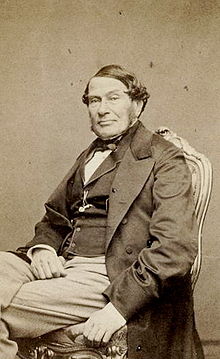Achille Fould
Achille Fould (born November 17, 1800 in Paris , † October 5, 1867 in Tarbes ) was a French finance and statesman.
Life
Achille Fould was the son of a Jewish banker. In addition to banking, he also devoted himself to the fine arts and made trips to Italy and the Orient. He later took over the management of the Parisian banking house Fould, Oppenheim & Co with his older brother, Benoît Fould . During the reign of Louis-Philippe I , who often availed himself of his counsel in financial matters, Fould was appointed a member of the General College for Commerce. Elected to the Chamber of Deputies by the Hautes-Pyrénées department in 1842 , he showed himself to be an ardent supporter of the Guizot ministry and often and successfully took the floor on financial issues.
After the February Revolution of 1848 , Fould was elected to the Constituent National Assembly in Paris in September , where he joined the conservative association of Rue de Poitiers and joined President Louis-Napoléon Bonaparte . In the general elections in May 1849 he was defeated because he had advised the provisional government on certain financial projects that were unsavory to public opinion. Only in July, in the by-elections in Paris, did he manage to get a seat in the legislature.
In the Bonapartist cabinet of October 31, 1849, Fould took over the portfolio of finances , which he retained even with the change in January 1851 and in the definitive ministry of April 11. As a result of the abdication of all ministers on October 14, 1851, he also withdrew, but a few days after Louis-Napoléon Bonaparte's coup d'état of December 2, 1851, he again took over the financial management, which he, however, when in January 1852 the confiscation of the goods of the Orléans dynasty was imposed, laid down again. As finance minister, Fould gave the first impetus to found the Crédit mobilier , tried to reawaken the confidence of the capitalists, regulated the registration fees, the postal service, the postage, abolished the compulsory exchange rate for banknotes, and introduced a more even distribution of property taxes a new estimate of the basic income and showed, although a supporter of the protective tariff system, but also not averse to the reduction of tariffs.
Appointed senator on his resignation as finance minister , Fould resumed the ministry as minister of state on July 30, 1852, and as minister of the imperial house on December 14, 1852, and at the same time received the administration of the civil list and the crown donations. The following year he received the administration of the Grand Opera in Paris. In 1857 he was elected to the Académie des Beaux-Arts , and in 1858 he was appointed by Emperor Napoleon III. in the Privy Council. With the changes in November 1860, he put down his portfolio.
In September 1861, Fould addressed a memorandum to Napoleon III in which he stated that France's financial position was in danger and advised the emperor to renounce his constitutional right to arbitrarily grant extraordinary loans without the involvement of the legislature. The emperor accepted these proposals and on November 14, 1861 again appointed Fould Minister of Finance. In the meantime, as a result of the constitutional amendment made by the Emperor in January 1867, which seemed to him to contain excessive concessions to the opposition, Fould put down his portfolio again. He died unexpectedly on October 5, 1867, at the age of almost 67 in Tarbes.
literature
- Fould, Achille . In: Meyers Konversations-Lexikon , 4th edition, 1885-92, 6th volume, p. 468 ( online ).
Web links
| personal data | |
|---|---|
| SURNAME | Fould, Achille |
| BRIEF DESCRIPTION | French finance and statesman |
| DATE OF BIRTH | 17th November 1800 |
| PLACE OF BIRTH | Paris , France |
| DATE OF DEATH | October 5, 1867 |
| Place of death | Tarbes , France |
